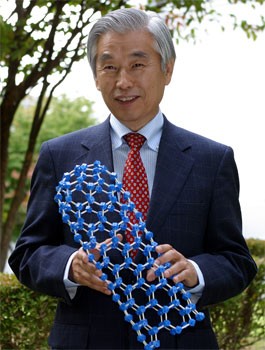
Kavli Laureate Sumio Iijima at British Science Festival
Sumio Iijima who shared the first Kavli Prize in nanoscience with Louis E. Brus in 2008, will be appearing at the British Science Festival on the 7th of September. Iijima of Meijo University in Japan, is one of the world's leading figures at the forefront of nanotechnology research. He is widely credited for the discovery of carbon nanotubes. In his speech at the University of Surrey Iijima will talk about his work and the possibilities for the future.
Sumio Iijima studied at the University of Electro-Communications in Tokyo and completed his PhD in physics at Tohoku University, in Sendai, before moving to Arizona State University in Phoenix, Arizona. In postdoctoral research and later as a research scientist from 1970 to 1982, he worked on high-resolution electron microscopy.
Iijima revealed the first electron micrograph showing atoms in a crystal. He developed a new electron microscope that could view the structure of materials at the atomic level. In 1977 he achieved a long-term goal of electron microscopy when he was able to observe individual tungsten atoms. He carried out electron microscopy of graphite while working as a visiting scholar at Cambridge University in 1979.
Iijima moved back to Japan in 1982. He has been a Research Fellow at NEC Corporation since 1987 and published his seminal work on carbon nanotubes in 1991. Although carbon nanotubes had previously been observed, his paper generated unprecedented interest and stimulated a great deal of further research in the field.
Iijimas has been a Professor at Meijo University in Nagoya, Japan, since 1999. He has received close to three dozen awards and prizes for his research including the Asahi Award in 1996, the Agilent Technologies Europhysics Prize in 2001, and the McGroddy Materials Prize in 2002 from the American Physical Society, as well as the Benjamin Franklin Medal in Physics, also in 2002.
Kavli Prize Laurates
Louis E. Brus of Columbia University, US, and Sumio Iijima of Meijo University in Japan, shared the nanoscience prize for their respective discoveries of colloidal semiconductor nanocrystals, also known as quantum dots, and carbon nanotubes.
Major advances being predicted in fields as diverse as electronics, the environment, energy and bio-medicine would not have been possible without Brus and Iijima’s contributions in explaining the unusual properties of particles so small that electron motion is confined to zero or one dimension.
 Louis Brus and Sumio Iijima received the Kavli Prize in nanoscience at an award ceremony in Oslo, Noway in September 2008. In the middle Fred Kavli who initiated the prize. Photo: Håkon Mosvold Larsen/Scanpix
Louis Brus and Sumio Iijima received the Kavli Prize in nanoscience at an award ceremony in Oslo, Noway in September 2008. In the middle Fred Kavli who initiated the prize. Photo: Håkon Mosvold Larsen/Scanpix